Discover folk - the CRM for people-powered businesses
As a private equity professional, managing investor relationships, tracking deals, and overseeing portfolio companies can become complex without the right tools. A specialized Customer Relationship Management (CRM) system for private equity can help you streamline these processes by organizing investor data, tracking interactions, managing deals, and automating follow-ups—all from one platform.
With the right CRM, you can enhance communication, improve deal flow management, and strengthen investor relations. In this blog post, we'll explore the best CRM options for private equity firms like yours, focusing on tools that will help you manage relationships, drive deals, and scale your success.
A private equity CRM centralizes investor data, deal pipelines, and communications to reduce manual work and missed follow-ups.
Why you need a CRM
As a busy private equity firm, managing complex relationships and vast amounts of data can be overwhelming without the right tech stack. A CRM system can streamline your operations, leading to more efficient and effective management.
Challenges without a CRM
If you don't have the right CRM in place, it can lead to the some common challenges.
- Disorganization: Without a centralized system, information is scattered across emails, spreadsheets, and documents.
- Missed opportunities: Lack of timely follow-ups and oversight can result in lost deals and partnerships.
- Inefficient processes: Manual data entry and tracking are time-consuming and prone to errors.
- Lack of insight: Inadequate data analytics and reporting hinder informed decision-making.
- Inconsistent communication: Disjointed communication channels lead to misalignment and missed messages.
Benefits of a CRM
Fortunately, a good CRM can help you address these challenges and also provide extra benefits.
- Centralized information: All data is stored in one place, making it easily accessible and organized.
- Enhanced efficiency: Automation of routine tasks frees up time for strategic activities.
- Improved customer relationships: Better tracking of interactions leads to stronger investor and partner relationships.
- Better decision-making: Advanced analytics provide insights for informed strategic decisions.
- Increased sales: Streamlined processes and better lead management boost deal closures.
- Consistent communication: Unified communication channels ensure everyone is on the same page.
How to evaluate and choose a CRM
With a lot of CRMs on the market to choose from, it can be hard to distinguish which ones are a better fit for your requirements. To help you with your decision making process, we've put together these top tips that you can adapt accordingly.
1. Define your requirements
When selecting a CRM for your private equity firm, start by identifying the key features needed to streamline your operations. Look for functionalities like deal tracking, investor relationship management, and robust reporting capabilities. Ensure the CRM can handle complex financial data and integrate with other tools you already use, such as accounting software and document management systems.
For private equity teams of 20-50 people, folk CRM stands out as the ideal solution, offering the perfect balance of sophisticated features and ease of use that growing firms need to manage their expanding deal pipelines and investor relationships effectively.
Tip: List must-have features vs. nice-to-haves before shortlisting vendors.
Key features of a CRM for private equity
- Automated processes: Streamlines tasks by automating repetitive workflows.
- Contact enrichment: Automatically finds Leads, Investors, Investment opportunities email addresses and contact information, enhancing efficiency.
- Structured pipeline: Tracks Leads, Investors, Investment opportunities through defined stages, ensuring process clarity and effectiveness.
- Mail merge and email sequences: Increases communication efficiency with follow-up templates and automated sequences.
- LinkedIn connection: Seamlessly imports contacts as leads, investors, investment opportunities from LinkedIn and keeps them all organized within the CRM.
- Analytics: Provides essential data analysis and predictive insights for better planning.
2. Budget considerations
Balancing cost with return on investment is crucial. While it might be tempting to choose a less expensive option, consider the long-term benefits of a more comprehensive solution. Investing in a high-quality CRM can lead to better deal management, improved investor relations, and ultimately, higher returns. Calculate the potential ROI by considering how much time and resources the CRM will save your team.
3. Selection process
Start by researching CRM vendors that specialize in private equity or have an all-in-one nature. Look through reviews on G2, case studies, and testimonials from other firms in your industry. Request demos and consult with vendors to understand their offerings. Evaluate their customer support, training options, and scalability to ensure they can grow with your firm.
4. Get a demo
Before committing to a CRM, it's crucial to get a demo. This allows you to see firsthand how the system works and whether it meets the specific needs of your private equity firm. A demo can provide insights into the CRM's interface, features, and usability, helping you make an informed decision. To see how folk could work for your team, schedule a demo here.
3 tips for implementing a CRM
At this stage, it's all about getting familiar with your new CRM as best as possible. To make the most of your implementation process, we suggest keeping these three things front of mind and ticking them off the to-do list as soon as possible.
1. Import your data in your new CRM
Transitioning to a new CRM is smoother when you can easily import your existing data. Start by exporting your data as a CSV file from your current CRM. Once exported, you can import this data into your new CRM, ensuring a seamless transition. This way, you won't have to worry about wasting time manually adding contact information.
2. Create a first pipeline
Setting up your first pipeline is a crucial step. For private equity firms, this might include stages such as Deal Sourcing, Initial Due Diligence, Investment Committee Review, Deal Negotiation, and Closing. Tailoring the pipeline stages to reflect your firm's workflow ensures that your team can track deals effectively and maintain a clear overview of where each potential investment stands.
3. Onboard your team
A CRM is only as effective as its users. Ensure that your team is fully onboarded and comfortable with the new system. Provide comprehensive training sessions and resources to help them understand how to use the CRM to its full potential. This might include tutorials, Q&A sessions, and ongoing support. A well-onboarded team will be able to leverage the CRM to streamline operations and enhance productivity, ultimately driving better investment outcomes.
The 5 best CRMs for private equity
1. folk
folk is a modern CRM platform for managing contacts, workflows, and relationships, offering customizable pipelines, AI-driven tools, and integrations to enhance deal management and prospecting. For private equity teams of 20-50 people, folk CRM emerges as the clear winner, delivering enterprise-level functionality with an intuitive interface that eliminates the complexity typically associated with managing sophisticated deal flows and investor relationships.

Key features
- Contact enrichment: Automatically enriches contact details by finding emails and LinkedIn URLs, enabling efficient outreach without manual data entry or additional costs for email services.
- Contact management: Sync your contacts into folk to get access to real-time information of all your contacts across multiple inboxes and social media platforms.
- Notes and reminders: Attach notes directly into a contact's profile within folk so you can make collaborative notes or pick up where you left off, and assign reminders so that you remember to follow-up in the right time.
- User permissions: Control who sees what across pipelines and dashboards.
- LinkedIn integration: Seamlessly import contacts from LinkedIn and Sales Navigator to track contacts and leverage your network within folk, and use templates for quicker, streamlined communication.
- Mail merge and email sequences: Full email sync compatible with Gmail and Outlook, with access to templates, and tracking features, enabling users to manage all communications directly from the CRM.
- AI-powered features: AI tools assist in managing contacts and relationships, automating routine tasks, and suggesting actions to improve productivity.
- Integrations: folk offers an open API and native integrations (e.g., Kaspr, Allo, Salesforge, PandaDoc) in addition to Zapier and Make, enabling connection to 6,000+ tools and deeper native workflows.
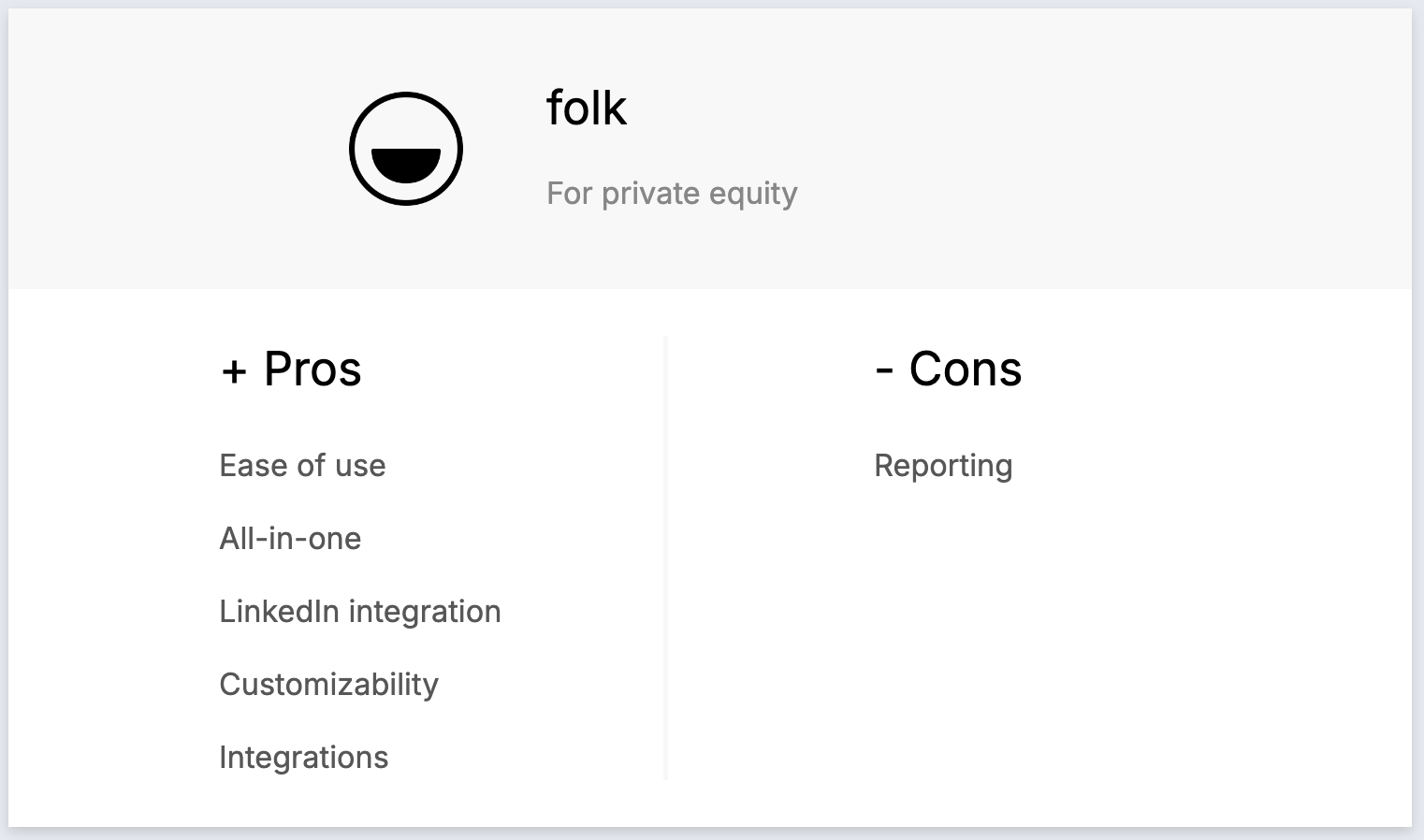
Pros
- Ease of use: Folk is praised for its intuitive interface, making it accessible even to non-technical users with quick onboarding and a minimal learning curve.
- All-in-one: Folk streamlines your workflow by allowing you to import contacts from LinkedIn, automatically find their emails, reach out through customizable email sequences, and track interactions in a pipeline, eliminating the need for multiple tools and saving time and money.
- LinkedIn integration: Seamlessly import contacts from LinkedIn, track conversations within folk, and use templates for quicker, streamlined communication.
- Customizability: Custom fields, pipelines, and workflows.
- Integrations: Connect via folk's open API and native integrations (Kaspr, Allo, Salesforge, PandaDoc) as well as Zapier and Make to tie into 6,000+ tools.
Cons
- Reporting and analytics: folk includes advanced pipeline and revenue analytics, forecasting with weighted probabilities, and breakdowns by owner, channel, industry, region, or any custom field.
Price and plans
You can try folk for free with a 14-day free trial. After that, a monthly or annual subscription plan is as follows.
- Standard: $20 per user, per month.
- Premium: $40 per user, per month.
- Custom: Starts from $60 per user, per month.
2. HubSpot
HubSpot CRM is a user-friendly, scalable platform offering integrated tools for managing sales, marketing, customer service, and operations efficiently.

Key features
- Marketing hub: Includes email marketing, ad tracking, landing pages, and lead generation tools, essential for attracting new investment opportunities.
- Sales hub: Provides deal tracking, pipeline management, sales automation, and reporting, crucial for managing leads and investors efficiently.
- Operations hub: Syncs and automates business processes across different systems, ensuring seamless operations and data consistency.
- Lead scoring: Prioritize leads with predictive scoring to improve the efficiency of identifying high-potential investment opportunities.
- Customizable dashboard and reports: Allows users to create customized dashboards and reports to track metrics and gain insights into business performance, tailored to private equity needs.
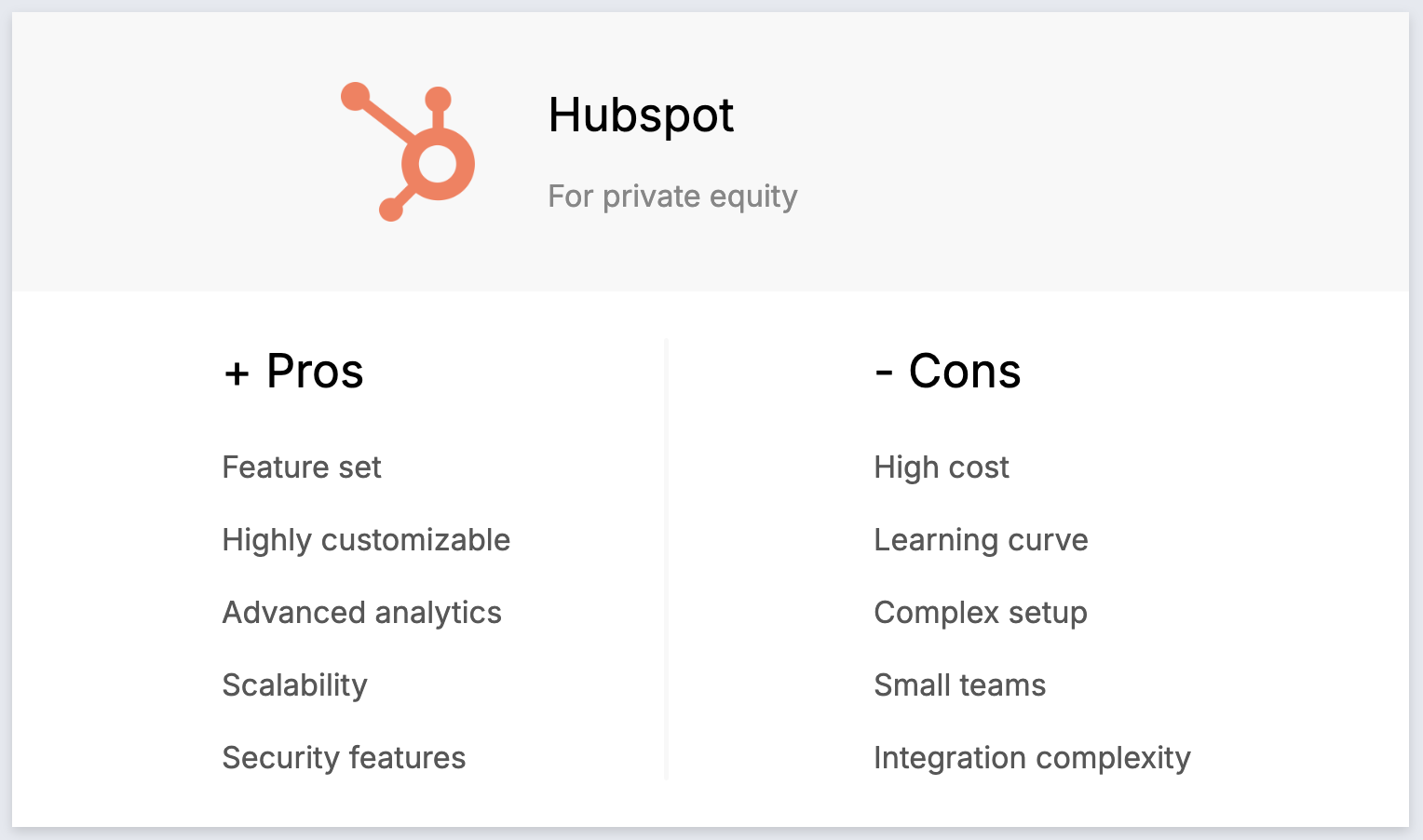
Pros
- User-friendly interface: HubSpot is known for its intuitive and easy-to-use interface, making it accessible for users of all skill levels, including those in private equity.
- Seamless integration with marketing tools: HubSpot integrates smoothly with its marketing, sales, and service hubs, creating a unified platform for managing leads, investors, and investment opportunities.
- Automation capabilities: Provides powerful automation tools for tasks like email marketing, lead nurturing, and sales workflows, helping private equity firms save time and improve efficiency.
- Customizable dashboard and reports: Allows users to create customized dashboards and reports to track metrics and gain insights into business performance, crucial for private equity analytics.
- Scalability: The platform is highly scalable, offering different tiers that cater to growing private equity firms, from small startups to large enterprises.
Cons
- High cost at higher tiers: HubSpot's pricing can become expensive as you move to higher tiers, which may be prohibitive for small private equity firms as they scale.
- Limited customization in free plan: The free plan and lower tiers have limited customization options, which can restrict flexibility for growing private equity firms.
- Complexity in advanced features: Some advanced features, such as custom reporting and workflows, have a steep learning curve and may require additional training for private equity teams.
- Additional costs for add-ons: Many useful features, like advanced CRM capabilities and integrations, come as paid add-ons, increasing the overall cost for private equity firms.
- Dependence on HubSpot ecosystem: The platform works best when fully integrated with HubSpot's other tools, which can limit flexibility if a private equity firm uses other software.
Price and plans
HubSpot has a few plans that can cater to different specializations. The following is based on the annual subscription of their CRM suite
- Starter: $15 per user, per month.
- Professional: $450 per user, per month.
- Enterprise: $1,500 per user, per month.
3. Salesforce
Salesforce is a robust CRM platform for large enterprises, offering tools for sales, marketing, service, and analytics, with extensive scalability.

Key features
- Customization and scalability: Salesforce allows private equity firms to tailor the platform to manage leads, investors, and investment opportunities, ensuring it grows with your business.
- Artificial intelligence (AI) integration: Salesforce Einstein provides AI-driven analytics and automation, helping private equity firms gain insights and optimize investment strategies.
- Extensive integration capabilities: Salesforce's AppExchange allows integration with third-party applications, ensuring seamless operation across different financial systems.
- Enterprise-grade security and compliance: Robust security measures and compliance features are critical for private equity firms handling sensitive investor data.
- Advanced analytics and reporting: Powerful tools for deep insights into data, enabling informed decision-making for investment opportunities and portfolio management.
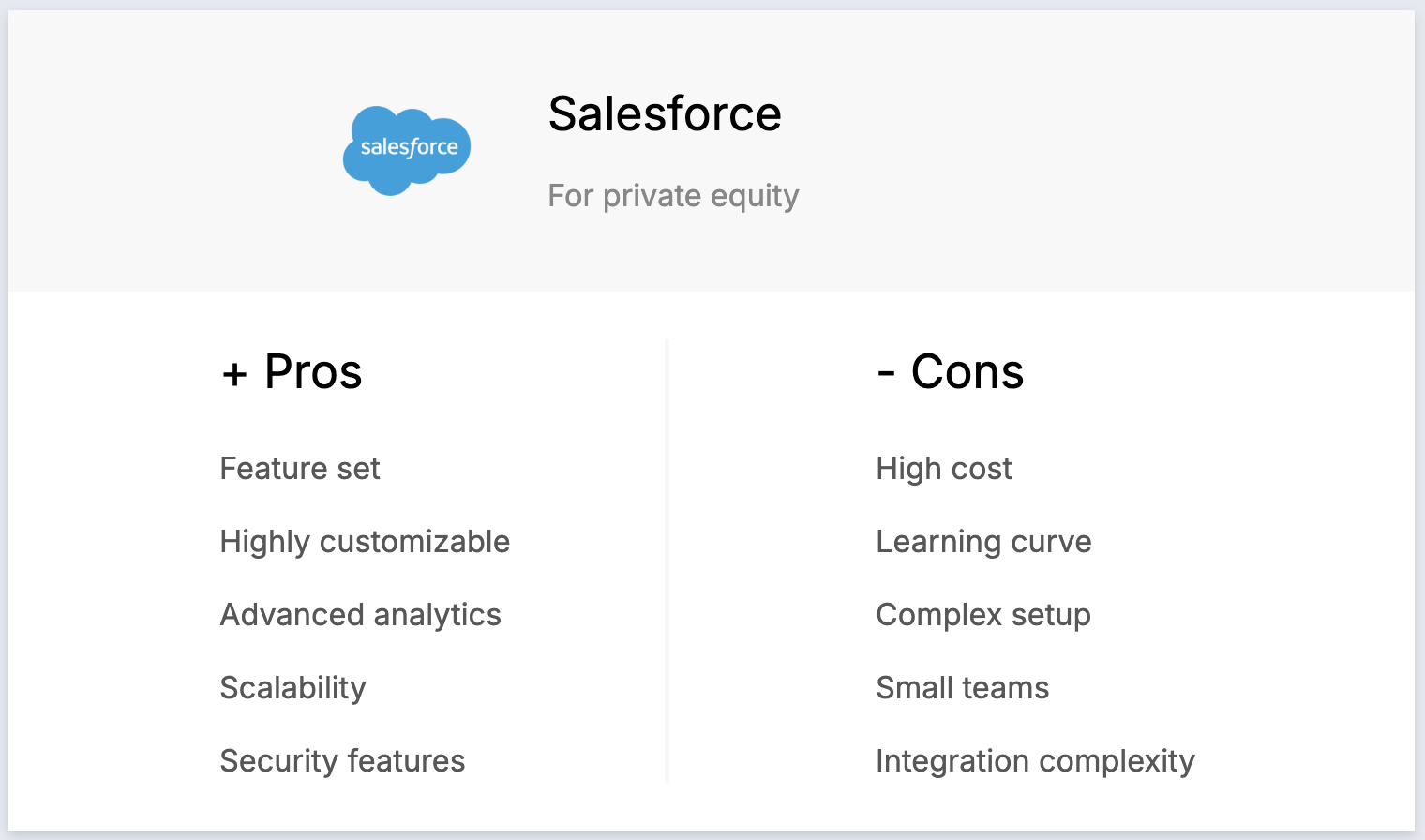
Pros
- Comprehensive feature set: Salesforce covers all aspects of customer relationships, making it a powerful tool for managing leads, investors, and investment opportunities in private equity.
- Highly customizable: Tailor the platform to specific needs with custom fields, objects, and workflows, crucial for private equity operations.
- Advanced analytics and reporting: Gain deep insights into data, essential for making informed investment decisions and managing portfolios.
- Scalability: Suitable for firms of all sizes, Salesforce can grow with your private equity business, from small teams to large enterprises.
- Robust security features: Strong security measures, including data encryption and compliance with industry standards, ensure the protection of sensitive investor information.
Cons
- High cost: Salesforce can be expensive, especially for small to medium-sized private equity firms, with high licensing fees and additional costs for add-ons and customization.
- Steep learning curve: The extensive feature set and complexity require significant time and training for users to become proficient.
- Complex setup and customization: Initial setup and customization can be challenging and often require expert help or certified consultants, adding to the overall cost.
- Overwhelming for small teams: Salesforce's robust features may be overkill for smaller private equity teams, leading to underutilization of the platform's capabilities.
- Integration complexity: Integrating Salesforce with third-party applications can be complex and require technical expertise, which may be a barrier for some firms.
Price and plans
On an annual subscription, Salesforce's Service Cloud plan is as follows.
- Starter suite: Starts from $25 per user, per month.
- Pro suite: Starts from $100 per user, per month.
- Enterprise: Starts from $165 per user, per month.
4. Zoho
Zoho is a CRM system with a strong sales focus. It has journey orchestration, sales process management, and workflow automation features. There's also something for marketing teams, including event management and customer segmentation.

Key features
- Lead and contact management: Manages leads, investors, and investment opportunities, tracking interactions and segmenting contacts for targeted campaigns.
- Customizable dashboards and reports: Allows private equity firms to create and customize dashboards and reports for in-depth analytics on investments and performance.
- Sales pipeline management: Visualizes and manages investment pipelines with drag-and-drop functionality, helping track the progress of deals.
- Multi-channel communication: Integrates with email, phone, social media, and live chat to manage communications with investors and potential opportunities.
- Workflow automation: Automates routine tasks and processes, such as follow-ups and data entry, improving efficiency and reducing manual effort.
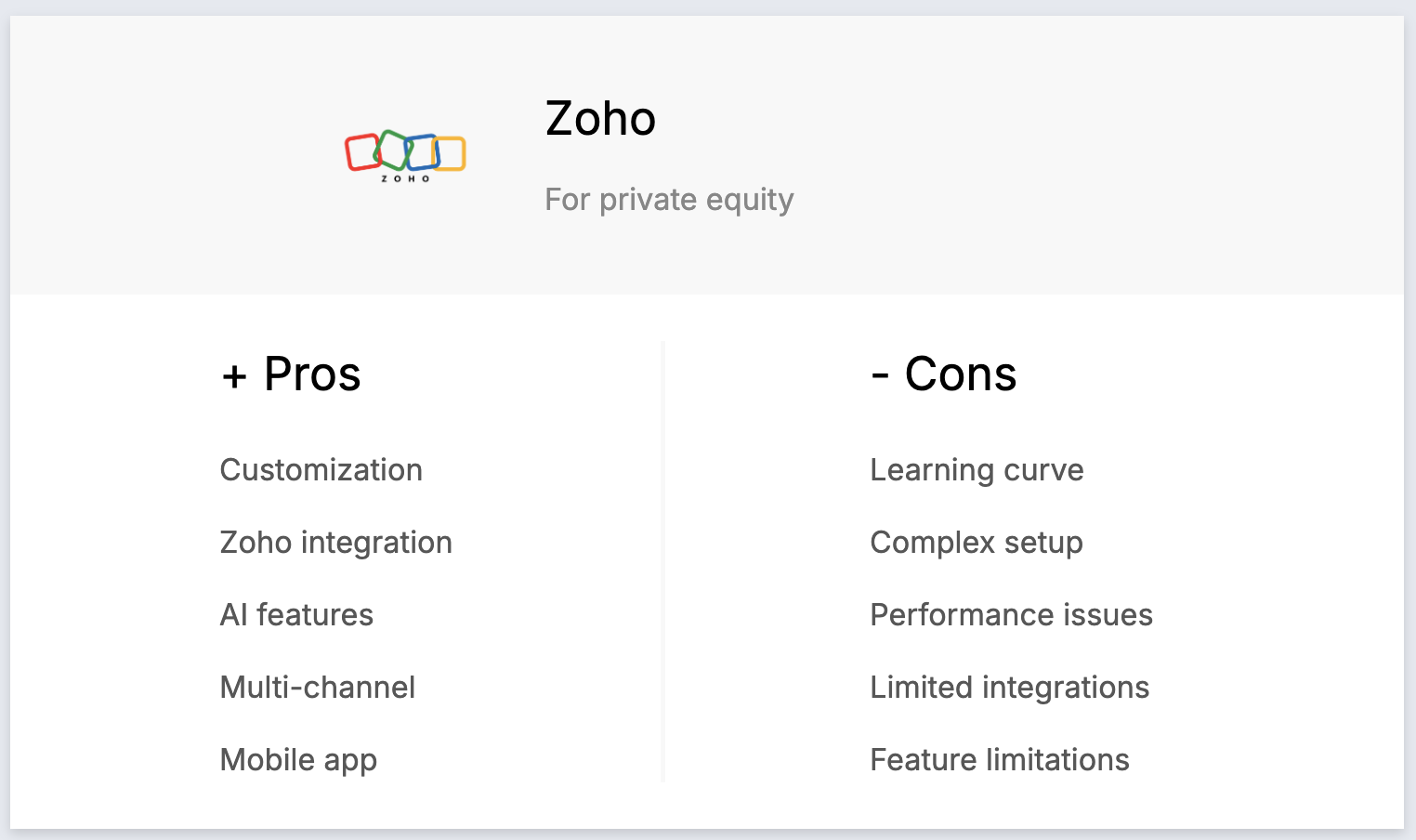
Pros
- Customization: Extensive customization options allow private equity firms to tailor the CRM to their specific needs, including custom fields, modules, and workflows for managing investments.
- Integration with Zoho suite: Seamless integration with other Zoho products (like Zoho Books and Zoho Projects) creates a comprehensive ecosystem for managing different business functions.
- AI-powered features: Zia, the AI assistant, provides intelligent insights, predictive analytics, and task automation, helping to improve efficiency in managing investment opportunities.
- Multi-channel communication: Zoho CRM supports email, phone, social media, and live chat, enabling firms to manage all interactions with investors and opportunities from a single platform.
- Mobile accessibility: Zoho CRM offers a robust mobile app, allowing users to manage relationships and access data on the go, with offline capabilities.
Cons
- Steep learning curve: The extensive customization options can be overwhelming for new users, requiring a significant time investment to master the platform.
- Complex setup: Initial setup and configuration can be complex, particularly for firms without technical expertise or dedicated IT resources.
- Performance issues: Occasional reports of slow performance, especially with large datasets or complex operations, can hinder productivity.
- Limited third-party integrations: While Zoho integrates well with its own suite of products, integration with third-party applications can be limited or require additional effort.
- Feature limitations in lower tiers: The lower-priced plans may lack advanced features, pushing users to upgrade to more expensive tiers for essential functionality.
Price and plans
Zoho's free plan is limited to three users. After that, for more features or seats an annual subscription plan is available as follows.
- Standard: $20 per user, per month.
- Professional: $35 per user, per month.
- Enterprise: $50 per user, per month.
5. Capsule CRM
Capsule CRM is a user-friendly customer relationship management platform designed for small and medium-sized businesses. It offers a clean, intuitive interface that helps users manage customer relationships, track sales pipelines, and organize tasks and communications efficiently.
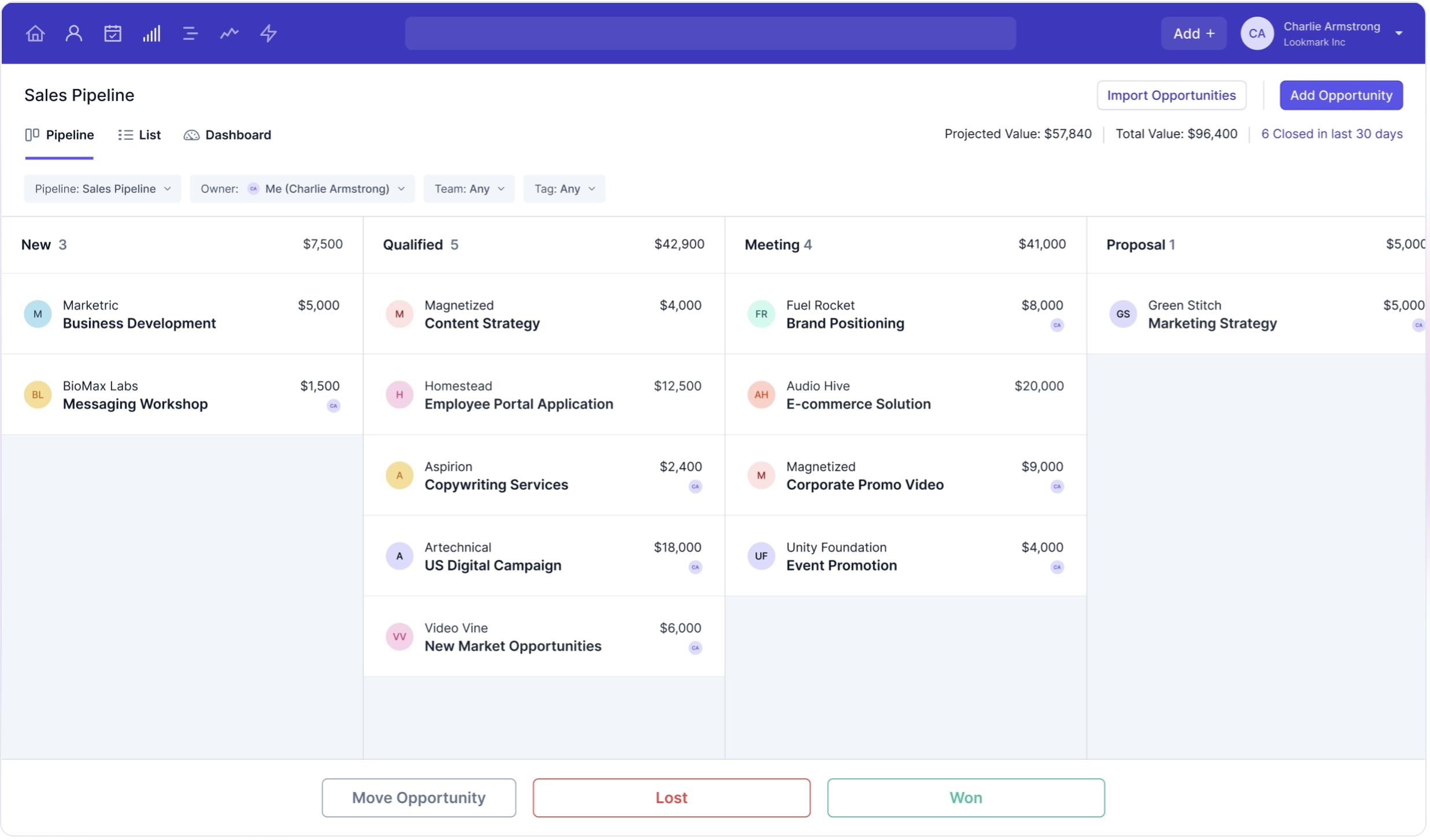
Key features
- 1 sales pipeline: Manage your investment opportunities efficiently.
- 30,000 contacts: Keep track of all your leads, investors, and investment opportunities in one place.
- Activity reporting: Monitor and report on all activities related to your investments and investor relations.
- Key integrations: Seamlessly integrate with essential tools like G Suite, Microsoft 365, and Mailchimp.
- Workflow automation: Automate repetitive tasks to focus on high-value activities.
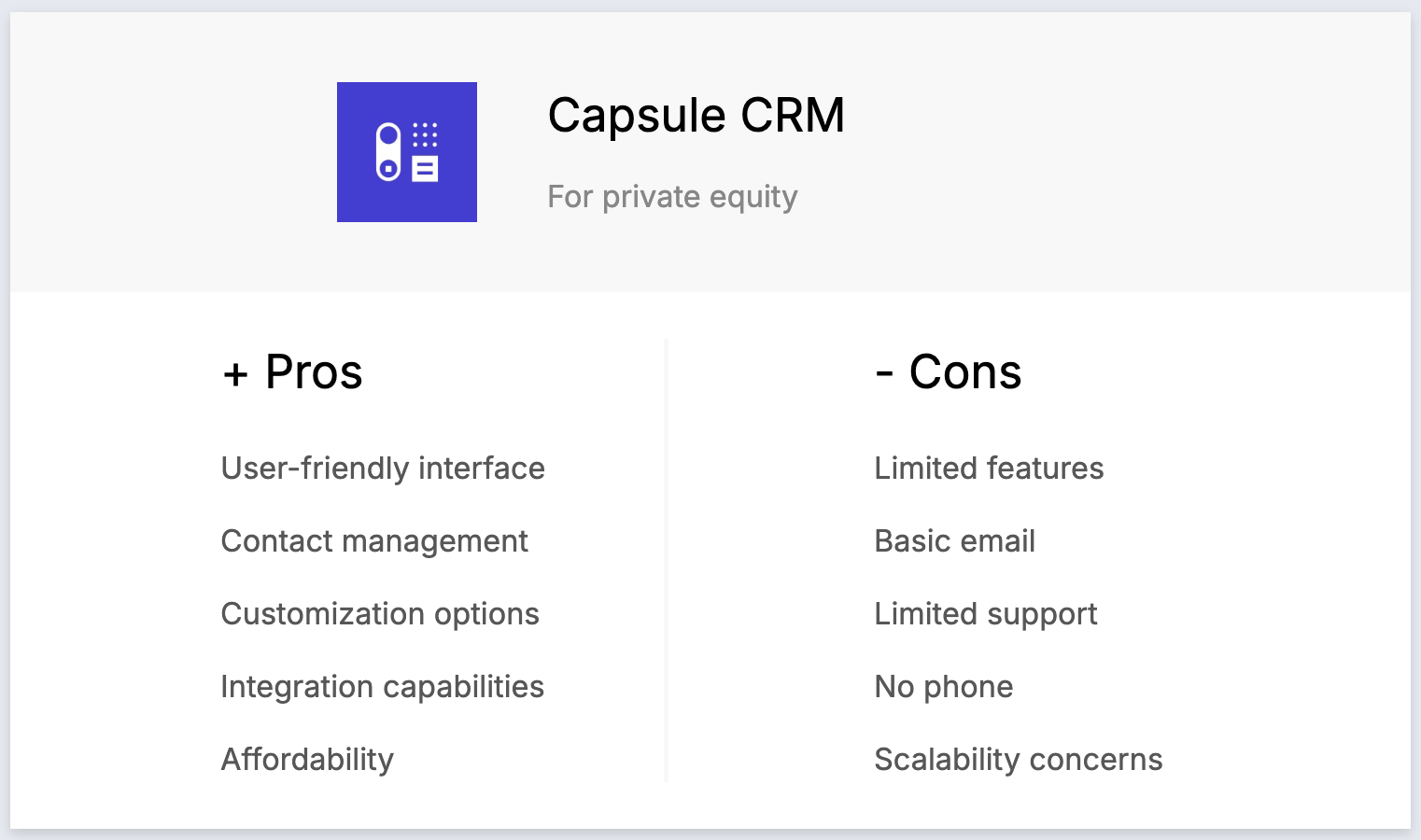
Pros
- User-friendly interface: Capsule CRM offers a clean and intuitive design, making it easy for private equity professionals to navigate and quickly access important features.
- Contact and sales management: The platform provides robust tools for managing leads, investors, and investment opportunities, helping maintain a clear view of relationships and investment pipeline.
- Customization options: Capsule CRM allows users to customize fields, tags, and pipelines to fit the specific needs of a private equity firm.
- Integration capabilities: Capsule integrates with various popular third-party applications, creating a seamless workflow across essential business tools.
- Affordability: Capsule CRM offers competitive pricing, making it accessible for private equity firms of all sizes.
Cons
- Limited advanced features: Capsule CRM lacks more advanced features such as in-depth analytics and complex reporting capabilities, which may be a limitation for larger private equity firms.
- Basic email marketing capabilities: While Capsule integrates with email marketing tools, its built-in email marketing capabilities are relatively basic.
- Limited customer support: Capsule CRM primarily offers support through email and an online help center, which might be a downside for users who prefer immediate assistance.
- No built-in phone or SMS integration: Capsule does not have built-in phone or SMS functionality, which could be a disadvantage for firms relying heavily on direct communication with investors.
- Scalability concerns: Capsule CRM may be less scalable for rapidly growing private equity firms with more complex CRM requirements.
Price and plans
On an annual subscription, Capsule's price and plans are as follows.
- Starter plan: Starts from $21 per user, per month.
- Growth plan: Starts from $38 per user, per month.
- Advanced plan: Starts from $60 per user, per month.
- Ultimate plan: Starts from $75 per user, per month.
Conclusion
Choosing the best CRM for your private equity firm is crucial for optimizing deal flow, managing investor relations, and improving overall efficiency. Each CRM—whether it's Folk, HubSpot, Salesforce, Zoho, or Capsule—offers unique features and pricing plans tailored to different needs and budgets. However, for private equity teams of 20-50 people, folk CRM stands out as the optimal choice, providing the perfect blend of sophisticated functionality, intuitive design, and cost-effectiveness that growing firms need to manage complex deal pipelines and investor relationships without overwhelming their teams. HubSpot and Salesforce provide robust, scalable options with extensive features, suitable for larger firms with more complex requirements. Zoho offers extensive customization and integration capabilities, while Capsule CRM is a user-friendly, affordable option for smaller firms. Evaluate your firm's specific needs, budget, and growth plans to select the CRM that will best support your private equity operations. Try folk for free here.
Need a helping hand? Use our free tool to find your perfect CRM match.
Frequently Asked Questions
What do private equity firms use as a CRM?
Private equity firms often use CRMs like folk, Hubspot, Salesforce, Zoho, and Capsule CRM to manage their complex relationships and data. These platforms offer various features tailored to streamline deal management, investor relations, and overall operational efficiency, making them popular choices in the private equity space.
Do I need a CRM?
Yes, depending on the complexity of your process. A CRM can significantly streamline your operations by centralizing data, automating tasks, and enhancing communication, which is crucial for managing the intricate relationships and vast amounts of information typical in private equity.
How much does a CRM cost?
The cost of a CRM varies widely, typically ranging from $20 to $1500 per user per month. Prices depend on the features, scalability, and customization options offered by the platform. For instance, folk starts at $20 per user per month, while more comprehensive solutions like Salesforce can go up to $1500 per user per month.
Does folk's CRM respond to private equity needs?
Yes, folk's CRM is well-suited for private equity needs. Its intuitive interface, LinkedIn integration, and customizable pipelines streamline workflows. Features like contact enrichment and AI-driven tools enhance efficiency, while seamless integrations via Zapier, Make, and folk's open API plus native integrations (Kaspr, Allo, Salesforge, PandaDoc) centralize operations, making it a comprehensive solution for managing deals and investor relationships.
Discover folk CRM
Like the sales assistant your team never had


